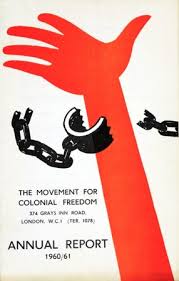Difference between revisions of "Movement for Colonial Freedom"
m (→History) |
m |
||
| Line 4: | Line 4: | ||
|image_width=240px | |image_width=240px | ||
}} | }} | ||
| − | + | The '''Movement for Colonial Freedom''' ('''MCF''') was a political [[civil rights]] advocacy group founded in the [[United Kingdom]] in 1954. The [[MCF]] had the support of many MPs including [[Harold Wilson]], [[Barbara Castle]] and [[Tony Benn]]. It also had backing among celebrities such as [[Benjamin Britten]] and in the universities. In 1970 the MCF was renamed '''Liberation'''.<ref>''[http://library-2.lse.ac.uk/archives/handlists/MovementforColonialFreedom/MovementforColonialFreedom.html "British Library of Political and Economic Science"]''</ref> | |
==History== | ==History== | ||
Latest revision as of 20:21, 6 November 2020
 | |
The Movement for Colonial Freedom (MCF) was a political civil rights advocacy group founded in the United Kingdom in 1954. The MCF had the support of many MPs including Harold Wilson, Barbara Castle and Tony Benn. It also had backing among celebrities such as Benjamin Britten and in the universities. In 1970 the MCF was renamed Liberation.[1]
History
In 2004, Labour History set out the background to the MCF:
Stan Newens spoke on the Movement for Colonial Freedom. In 1945 one fifth of the world was still under British sovereignty. 780 million people throughout the world still lived under European colonial world. Hopes of independence for the colonies under a Labour Government were not encouraged by the Labour Party’s general election manifesto which gave no commitment to introduce bills to provide for self-government, except in the case of India. Foreign Secretary, Ernest Bevin said that the loss of the colonies would mean falling living standards for British people. However continued colonial rule was in contradiction to the Atlantic Charter which advocated full sovereignty for all the world’s peoples. In some British colonies repression was on the order of the day – in Malaya for instance communist insurgents were put down by British security forces, who even used head hunters to bring in rebels’ heads. This news was concealed from the British public but anti-colonial activists received the photographic evidence. Fenner Brockway played an active role in convening a conference of anti-colonialists and representatives of nationalist and independence movements, and black organisations such as the League of Coloured Peoples in 1947. Offices were set up in Paris and London and in 1948 the Congress of People’s Against Imperialism was established.
With the outbreak of wars against French rule in North Africa the Paris office was closed. By now India, Ceylon and Burma had their independence. In Africa however independence organisations, such as the Mau Mau led by Jomo Kenyatta were established and solidarity was called for. Against this background, the Movement for Colonial Freedom was founded in 1954. The Labour Party’s official position was not to support independence leaders. This however was not universally accepted and 70 MPs, including Harold Wilson and Barbara Castle, supported the Movement for Colonial Freedom. It had support also amongst celebrities such as Benjamin Britten and in the universities. Fenner Brockway was the chairman, Douglas Rogers the secretary and Tony Benn the treasurer. It had a lot of support amongst the rank and file of the Labour Party and trades union movement and waged a very high profile campaign. It drafted over 1500 parliamentary questions. Press cuttings from Kenya proved that prisoners in the independence movement had been beaten to death at Hola Camp and Barbara Castle succeeded in getting this confirmed in the House of Commons. In 1963 Kenyatta declared an independent republic.
Other activities were organised by the MCF around the Suez Crisis in 1956. A Suez Emergency Committee was set up. In the end however the Labour Party itself took over the organisation of the demonstration on 4th November 1956 against the British invasion of Egypt. The MCF campaigned for freedom for the Portuguese colonies in Africa, for peace in Vietnam, support for Fidel Castro in the Cuban revolution and opposition to the seizure of power by the Ba’ath Party regime in Iraq and the reign of terror against its opponents. But it was divided on the question of Israel. On the homefront it fought racism and mobilised opposition to Enoch Powell’s rivers of blood speech in 1968. The MCF continued to campaign against neo-colonialism after independence, and opposed military take-overs in Africa, Asia and Latin America, such as the Pinochet coup in 1973. In 1970 it was renamed “Liberation” and will celebrate its 50th anniversary in May 2004.[2]
References
Wikipedia is not affiliated with Wikispooks. Original page source here